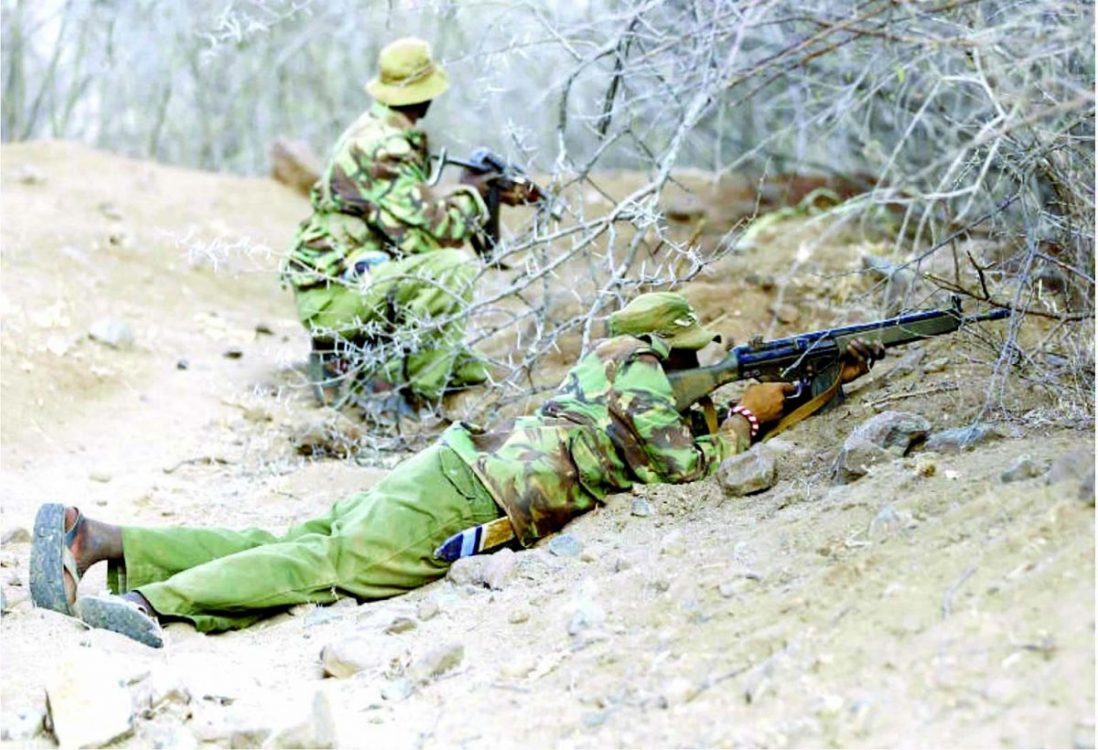Queries on North Rift killer bandits despite State vow

Questions have emerged on the government’s failure to end insecurity in the North Rift, even as President William Ruto directed Kenya Defence Forces (KDF) to join hands with police in armed operations.
Ruto, who had promised to wipe out banditry upon assuming power, yesterday met leaders from Baringo County at Nakuru State House. He said he had directed KDF to work with the National Police Service (NPS) to fight bandits in Baringo, Kerio Valley and other parts of the country.
The President issued a three-day amnesty to people in possession of illegal firearms in the county to surrender them. His directive to KDF to join the operation reportedly becomes effective today.
“We will deal firmly with the drivers of illegal arms. This is necessary and urgent, particularly in the North Rift. We must endeavour to nurture peace for the transformation of our country,” Ruto later twitted.
Sources said those at the meeting included Baringo Governor Benjamin Cheboi and MPs Joseph Makilap (Baringo North), Musa Sirma (Eldama Ravine) and William Kamket (Tiaty).
Insecurity has left at least 40 people dead in Baringo, Elgeyo-Marakwet and Turkana this year. Former Rift Valley Regional Coordinator George Natembeya accuses the government of using poor strategies and lacking commitment to the security mission. He alleges poor remuneration and facilitation, lack of motivation and poor equipment for the cyclic cases of banditry.
“None of these police officers whom you see being gunned down is given allowances. The salaries they get while serving in areas like Kapedo are similar to their traffic counterparts in the city. There is no incentive,” he says.
Natembeya says the security personnel are often compromised. “Even food, they do not have. It reaches a point they resort to unholy alliances with bandits such that they lease out guns, and give away bullets, for goats so they can get something to eat,” he says.
“I served as Regional Co-ordinator here for three years. The officers work under very poor conditions. They sometimes go without food for days,” he adds.
Natembeya, who is now the Trans Nzoia Governor, notes that some government officials benefit from the proceeds of stolen livestock after colluding with armed criminals and bungling security operations.
“They get a proper security briefing on the hideouts of criminals — including the coordinates — but they deliberately hit the wrong places during security operations,” claims Natembeya.
Security experts also argue that posting security personnel to unfamiliar territories is detrimental, as they lack knowledge of the terrain and the people’s ways of life.
Unfair transfers
Oversight agencies have also blamed police bosses in Nairobi for using transfers to banditry-prone areas as a punishment and disciplinary measure against wayward officers. A report by the Independent Police Oversight Authority (IPOA) last year blamed the National Police Service for condoning a tradition where junior officers are transferred to far-flung, hardship areas as retribution for minor wrongs.
Such officers, according to IPOA, lose morale and gradually care less about the crime rate in the places they have been “thrown to waste away.”
On the ground, many of these officers find themselves with less powerful guns than the gangs. Several armoured personnel carriers (APCs) recently acquired from China ended up being ineffective.
Recently, four General Service Unit (GSU) officers were shot dead in an ambush by armed bandits at Napeimoit in Turkana County. The bandits injured seven others, including an OCPD and top GSU and Rapid Deployment Unit bosses.
Shot indiscriminately
Turkana County Commissioner Jacob Ouma said more than 200 armed bandits shot indiscriminately at the officers. Then another group attacked the officers from behind. The exchange of fire lasted more than two hours,” said Ouma. People Daily established that the attackers stole the dead officer’s uniforms and firearms.
Two days earlier, three people were killed when a Lodwar-bound matatu they were travelling in was sprayed with bullets.
So daring are the bandits that they even stage attacks near venues of meetings by senior government officials, apparently to show they are untouchable.
Last week, bandits lit a bonfire just metres from where Interior Cabinet Secretary Kithure Kindiki was addressing a security meeting in Baringo County.
In photos which went viral, smoke is seen billowing from the notorious Korkoron Hills in the Baringo South sub-county as the meeting was going on.
This put on high alert the security personnel accompanying the CS and other leaders. The CS toured schools which are yet to be reopened as a result of insecurity, among them Kapindasum, Arabal and Kasiela primary schools, as well as Embosos Secondary. The meeting continued after the situation cooled down.
Prof Kindiki assured residents that the Kenya Kwanza government is committed to restoring peace in all parts of the country. “The government will undertake the reconstruction of learning institutions which have been vandalized by bandits. A criminal is a criminal and we will deal with them as such,” said Prof Kindiki.
Leaders from the area want the government to deploy KDF to bandit hideouts in Kerio Valley and other parts of the North Rift, and roll out disarmament exercises.
Governors Wisley Rotich (Elgeyo-Marakwet) and Benjamin Cheboi (Baringo) and senators Aaron Cheruiyot (Kericho) and William Cheptumo (Baringo), as well as MPs from banditry-hit regions, decried a rise in the number of armed herders.
“The government should also reorganise the security arrangements and move police stations to restive areas,” said Baringo North MP Joseph Makilap. He called for critical infrastructure such as roads to ease the movement of security personnel, and the use of microchips on all livestock in the region to ease tracking and recovery efforts.












